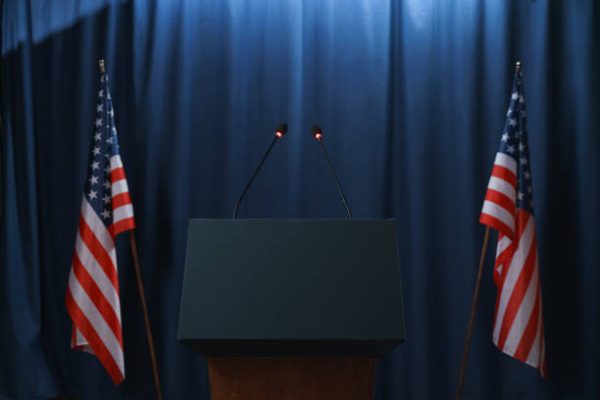
Presidential debates 2024 — do they have a future, or are they a dying tradition in a landscape that increasingly caters towards digitized and short content media? Before answering if there is a future, there must first be a past.
Presidential debates arose in their modern form with the arrival of mass media through communication technologies such as the radio. With Americans all across the country equipped with civic desire and a radio, presidential debates became national events where candidates could engage in public discourse. These debates specifically allowed candidates to address each other’s professional policies and personal character on terms not strictly dictated by their party or their affiliations.
Presidential debates really hit their stride when they became televised. The first televised debates in history were for the election of 1960, where Democratic candidate John F. Kennedy gained an advantage due to his handsome appearance and charismatic on-screen performance compared to Republican candidate Richard Nixon’s pale and sickly appearance. Nixon’s unfavorable ratings from the televised debates contrasted from the approval levels of his performance over radio debates, which were considerably in Nixon’s favor. Shifts such as these demonstrate only the beginning of the gradual shift away from civic discourse to “performative chauvinism,” as candidates aggressively display their opinions in increasingly theatrical manners.
In the decades following this debate, the rapidly increased use of televised debates led candidates to center their arguments around more cultural positions rather than policy positions. The candidate with more panache, humor, and charisma was preferred over the candidate who presented the best policy, according to research done by political science professor Joel Lieskie at Cleveland State University. In the elections of 1980 and 1984, Ronald Reagan benefited from this culture centered approach during debates as he presented policies that, while otherwise disliked, became popular among Americans when spoken in a convincing and charismatic manner that trumped that of his opponents: Jimmy Carter and Walter Mondale.
As time has gone on, debates have undergone several more changes. In the debates for the 2016 election cycle, there were massive changes in conduct when Republican candidate Donald Trump adopted a populist and bullying approach through ignoring policy issues almost completely in favor of cultural recognition and pleading martyrdom if he lost. According to Lewis and Clark political science professor Ben Gaskins, “Trump is a unique force, his debate strategy is to generate conflict and appeal to his base. It is light on policies, focusing on grabbing attention, [but] not very substantive.”
Consequently, the power of debate moderators was increased in order to allow them to shut off the microphones of debaters, fact-check statements, and — most recently — serve as the only audience members of the debate. Gaskins explains that these adjustments change “the dynamics of the room, all factors coming together to affect how the debate is carried on.” Without an audience, Trump came across as more — according to Gaskins — “outlandish” even amongst his own supporters by talking about “Haitian immigrants eating cats and dogs.” Gaskins explains how previously the audience endorsed his chauvinism, but with their absence he was robbed of his theatrical charisma.
Newly eligible voters Giselle Ursin and Brennan McEwen additionally had words on the structure of this year’s debates. Ursin claimed that the moderators “seemed smart, and asked unbiased questions.” By contrast, McEwen claimed, “It is hard to have impartial moderators, [but] fact checking is good [as] fake news is a prevalent [damaging] force.”
In spite of the changes in debating styles presented by Trump and empowered moderators, debates still serve a unique and essential function that no other campaign strategy can or has. Gaskins explains that presidential debates are “the top forum to learn about Harris or Trump for many voters.” Gaskins also emphasizes the importance of the objectivity found only with presidential debates. Unlike campaign rallies or party held functions, debates “get candidates to address issues not on their terms,” forcing them to demonstrate their qualifications without a large checkbook or display behind their words. When this reality is confronted, audiences get a better look into who the candidate is as a person, their ability to hold their own, and the positions they believe will benefit the nation. Furthermore, the back and forth between the candidates helps Americans get a clearer view of them beyond what they preach during campaigning. These features of the debates, therefore, allowed many people to learn more about Harris and gain an insight into her character as she showcased her ability to stand up to Trump.
Contrastingly, the greatest weaknesses of debates are that they are theater. Gaskins concurs with this point by saying,“People come away entertained by the sport, but don’t feel it was as substantive as preferred.” Ever since Trump’s entrance onto the debate stage, debates have become a medium of argument and theater. Instead of concern over who had the best policies, the concern is who made the best insults to each other. Ursin corroborates this point again by expressing that the debates felt like a “verbal brawl, a lot of talk, and not much policy.”
Ursin also described the debates as “much more in the past and not the future.” On this last note specifically, there are a lot of important changes far greater than the evolution of its conductivity: the number of debates went down from three to two — lessening their influence throughout the campaign cycle; and the impact of presidential campaigns increasingly shifts to social media or individual party platforms. Objectivity is lost as social media turns debates into biased “snapshots framing the [audience]’s party as the winner,” according to Gaskins.
This last change in particular is devastating to the purpose of debates being the most objective campaign medium. As American people utilize social media, objectivity and candidate exposure is traded for endorsement of partisan opinions claiming their candidate won a supposedly objective affair. Essentially, the authenticity and trust established by debates in decades past is working to its disadvantage as people use the reputation of the objectivity of debates to justify believing a positively framed snapshot of their preferred candidate as the better choice.
This becomes detrimental to civic discourse if voters only see the media they consume focus on the one time during the debate their preferred candidate came across as more eloquent and put together. Ideally, debates showcase candidates in their truest forms, allowing the people to assess the candidates’ qualifications. Social media can make moments like these the only thing a voter sees, especially among Americans who do not take the time to watch the debate in its entirety. This weaponizes the reputation of debates to create partisan indulgence tailored to an individual’s algorithm rather than an opportunity to witness and engage in healthy discourse.
To come to an answer to the question of if there is a future for presidential debates, it is important to consider if there should be a future. Gaskins expands on this by saying, “I consume social media to see how people are reacting, [providing a] valuable communal aspect that is uplifting.” Gaskins adds that not everyone is on social media, and “people not plugged up online miss out” for better or for worse. This point highlights that the perception of the influence of social media on American culture may not be as true as originally thought, and there is still opportunity for discourse to happen outside of those online spaces. Subsequently, the future of presidential debates may not be as grim in the context of social media’s influences. At least not yet.
In essence, social media’s monopoly on American culture provides a communal advantage by allowing increased spread of discourse between people across the country. Ursin elaborates on the value of discourse in presidential debates by explaining that it “shows candidates’ true colors, valuable to remove misleading information otherwise flooding people’s opinions. It’s important to see [candidates] talking without social media bias.” So, while social media does prove to be a very real threat to presidential debates and their longevity, debates continue to provide a level of honesty other campaign platforms don’t through the long and thoughtful discourse they spark online.
While social media’s negative dominance over political discourse does bring about gloomy narratives, it is the realization of this fact that has historically resulted in countercultures pushing against this negative product in favor of a more beneficial and balanced result. For example, the fear of nuclear proliferation was so palpable that governments on all sides worked their hardest to prevent nuclear war. Among this example are countless other additional conflicts that, while initially spreading dystopian fears, never come to light because people are so committed to preventing the worst from becoming reality. Debates will exist in the future because it is the commitment to improve the system — by both institutions and individuals — that ensures their survival.
Because of this, debates will persist, and their importance in American politics will continue as long as Americans come together united, not attached to using social media as a means to shape their perspectives. The democracy we inhabit, and the democracy to be inhabited in years to come will continue to be tested. While social media and its effect on election cycles may sabotage important influences in decision making — such as presidential debates — it is our collective commitment to solve these concerns that ensures our survival as a democracy and healthy society.


































